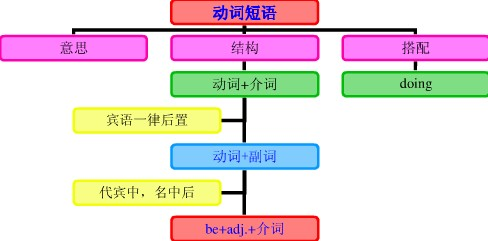本试题 “After living on campus for more than one year, we have _____ here.[ ]A. accustomed to studyingB. accustomed to studyC. been accustomed to studyingD...” 主要考查您对动词短语
现在完成时的被动语态
等考点的理解。关于这些考点您可以点击下面的选项卡查看详细档案。
- 动词短语
- 现在完成时的被动语态
动词短语的概念:
动词常和某些其他词类用在一起,构成固定词组,形成所谓短语动词(phrasalverb)。和动词一样,短语动词也可分为及物和不及物两种。短语动词可以作为一个整体看待,同一般动词一样使用。
动词短语的搭配类型:
1)动词+介词:这类短语动词用作及物动词,后面须跟宾语。
如:The small boy insisted on going with his parents. 那男孩坚持要跟父母一起去。
Do you often listen to broadcasts in English? 你常听英语广播吗?
Look at the children. Aren't they lovely? 看着这些孩子们。他们多么可爱呀!
We stand for self-reliance. 我们是主张自力更生的。
这一类的短语动词还有很多,如depend on(upon)(依靠),wait on(服侍),look for(寻找),deal with(对待),look after(照料),wait for(等待)等。
2)动词+副词:
这类短语动词有的用作及物动词,有的用作不及物动词。
如:I always get up as soon as the bell rings. 我总是一打铃就起床。(不及物)
Look out, there's a car coming! 当心,来汽车了!(不及物)
Have you handed in your exercises already? 你已经交练习了吗?(及物)
Please don't forget to put on your coat, it's cold outside. 请不要忘记穿外衣,外面很冷。(及物)
这一类的短语动词还有很多,及物如put out(扑灭),eat up(吃光),put down(放下);不及物如set off(出发),come up(走近),go on(继续)。
注:"动词+副词"这类短语动词和上面第一类"动词+介词"的不同之处在于:"动词+介词"用作及物动词,后面须跟宾语。"动词+副词"则有的及物,有的不及物;用作及物动词而宾语为人称代词或自身代词时,副词往往放在宾语之后。
如:Please wake me up at five tomorrow. 请在明天早上五点唤醒我。
If you have done your exercises, please hand them in. 如果你们练习做完了请交来。
She doesn't normally behave like that, she's putting it on. 她通常并不如此表现,她是装出来的。
注:这类短语动词有不少可兼作及物和不及物动词用。
如:He took off his hat when he entered the office. 他进办公室后脱下帽子。(及物)
The plane took off at seven sharp. 飞机在七点整起飞。(不及物)
Charlie rang up Neil to ask about the time of the meeting. 查理打电话给尼尔问开会的时间。(及物)
If you can't come, please ring up and let us know. 你如来不了,请来电话告诉我们一声。(不及物)
3)动词+副词+介词:
"动词+副词"之后有的可以再加一个介词,形成另一种短语动词。这类短语动词用作及物动词。
如:Do not give up hope. We must go on with the experiment 不要失望。我们必须继续试验。(go on with继续)
He came up to me. 他走到我跟前。(come up to走近)
这类短语动词还有:look down upon(看不起),do away with(去掉),put up with(忍受)等。
4)动词+名词+介词:
这类短语动词也是及物的。
如:He shook hands with all the guests at the banquet. 他在宴会上和宾客一一握手。
Young pioneers often come to the Children's Palace to take part in after school activities.少先队员经常到少年宫来参加课外活动。
Pay attention to the temperature of the stored rice. 注意仓库里的稻谷的温度。
Her job is taking care of the babies. 她的工作是照顾婴儿。
这一类短语动词还有:put an end to(结束),take notice of(注意),catch hold of(抓住),lose sight of(看不见),make use of(利用)等。
动词短语知识体系:

现在完成时的被动语态概念:
现在完成时被动语态的结构就是现在完成时态和被动语态结构的叠合,即“have+been+动词过去分词”。
现在完成时态的被动语态的构成:
1、现在完成时的被动语态的肯定式为:have/has+been+done。
如:The new schools have been set up. 新学校都已经建成了。
The experiment has been done successfully. 这个实验做得很成功。
2、现在完成时的被动语态的否定式为:have/has+not+been+done。
如:The books have not been borrowed by the teacher. 那些书还没有被老师借走了。
Tom's novel has not been published. 汤姆的小说还没有被出版。
3、现在完成时的被动语态的一般疑问句需将have/has提到主语的前面。
如:—Have the letters been posted? 信已经寄出去了吗?
—Yes, they have. 是的,已寄出了。
—Has his bike been repaired? 他的自行车修好了吗?
—No, it hasn't. 不,还没有被修好。
4、现在完成时的被动语态的特殊疑问句为:疑问词+have/has+been+done。
如:How long have the machine been repaired?这些机器已被修好多长时间了?
Who has been invited? 谁受到了邀请?
现在完成时态的被动语态的用法:
1、现在完成时的被动语态同它的主动语态一样,强调过去的动作对现在造成的影响或结果,通常与 already, yet, just, never, recently等副词连用。
如:The room has already been cleaned. 房间已经被清扫干净了。(含现在已不用清扫房间了)
The doctor hasn't been sent for yet. 还没有派人去请医生。(含现在应派人去请医生)
The office looks nice. It has just been cleaned. 办公室看起来很干净。它刚被打扫过。(含现在已不用清扫房间了)
Such a thing has never been heard of before. 这样的事以前从未听说过。(含现在才听说过)
Recently the price of TV sets has been cut. 近来电视机降价了. (含电视机的价格现在比以前低了)
2、表示一个被动的动作或状态开始于过去,持续到现在,并可能持续下去,常与for或since等引导的时间状语连用,或用与How long…?的句型中。
如:The machine has been repaired for two hours. 这台机器已修了两小时了。
They have been helped by us for two weeks. 他们得到我们帮助有两周了。
How long has the project been carried out? 这项工程已被实施多长时间了?
与“After living on campus for more than one year, we have __...”考查相似的试题有:
- Li Ping ________some Guangdong dialect while traveling there with his family this spring.A.took upB.brought upC.ma...
- It's very difficult to satisfy the manager for he has already________ three applicants this morning.[ ]A. turned away...
- Students’ using mobile phones in class can’t be ________.A put up B. stood C. beared D. tolerated
- ---Can I help you? --- I’d like a ticket for tonight’s show. How much do you _____A.chargeB.payC.spendD.cost
- —What strengths and ____ did you find in her?—She is hardworking but is not good at getting along with others.A.cour...
- You’ve done so much work that you’re ______ to pass the exam.A.exposedB.usedC.devotedD.bound
- —Ken, why do you look so tired? —I _____ myself _____ the climate since I came here.A.hadn’t adapted; toB.haven’t a...
- I'd like to______a doctor's appointment as soonas possible.[ ]A. set upB. put upC. make upD. pull up
- The company ________the job________someone else.Which of the following is NOT right?[ ]A. supplied; toB. provided; wi...
- He began to take political science ________ only when he left school.(2013·湖北)A.strictlyB.trulyC.carefullyD.ser...